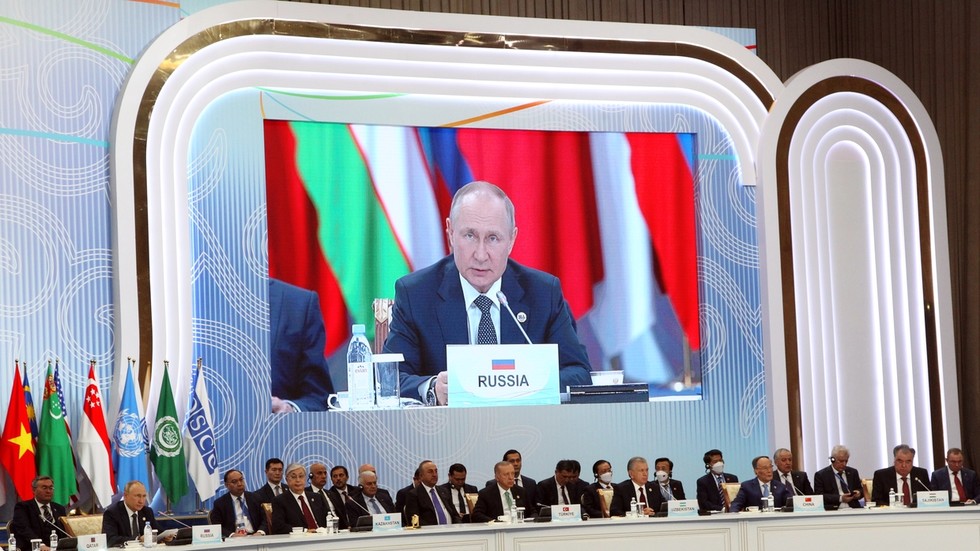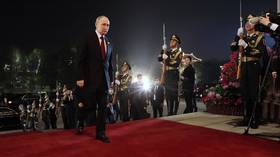
Moscow does not adopt a monolithic policy it takes on diverse roles in the region
By Alexander Korolev, Deputy Director of the Center for Comprehensive European and International Studies at the HSE

Russian President Vladimir Putin is seen on a screen as he delivers a speech during a plenary session of the 6th Summit of the Conference on Interaction and Confidence Building Measures in Asia (CICA) © Sputnik / Sputnik
Over the past several decades, Russia’s policy in Asia has not fit into the so-called “Asian Paradox.” This term, which became popular in academic and expert circles in the 1990s, may be defined as state-level interaction being “hot when it comes to the economy, but cold in politics.” This is a pattern characteristic of the continent, where difficult and often toxic political relations between countries go hand in hand with close trade, economic and investment cooperation.
Two factors in particular have been responsible for shaping the current situation.
Firstly, Russia did not consider Asia’s largest subregions (e.g. South Asia, Southeast Asia, and Northeast Asia) critically important, in contrast to other European countries and the post-Soviet space. Therefore, Russia had never been involved in the political and economic processes in Asia as closely as it has been in its traditional hinterland.
Secondly, for many years, Russia’s relations with Asia have been marked by an absence of major contradictions, historical trauma, or territorial and other disputes concerning sensitive issues (except in relations with Japan). For Russia, this was a particular strategic asset that favorably distinguished it from other major players like the United States and China.
Moscow’s policy in Asia has also been unique in that it didn’t fit into the classic “Asian paradox” formula, instead choosing to promote alternative models of interaction.

Read more
The “hot economy, cold politics” model applied only to relations between Japan and Russia. However, it is important to note that economic ties with Tokyo have always been far less significant than the latter’s links with the US, China, or ASEAN.
When it comes to China-Russia relations, the two countries have clearly established a “hot economy, hot politics” model in recent years. This is demonstrated by their continuously growing trade turnover, rising economic interdependence, and close political dialogue, since both countries participate in key multilateral formats such as BRICS, the SCO, and others.
With regards to the countries of South Asia and Southeast Asia, for many years we had observed the “reverse Asian paradox” trend: “cold economy, hot politics.” In other words, close institutional and political ties did not convert into practical achievements in the areas of trade and economics. For example, at its peak, bilateral trade with these countries barely reached $25 billion and has always depended on external market factors, primarily world energy prices. Prior to 2022, trade turnover with India was even less – about $13 billion, which clearly did not match the constructive ties between the countries at the level of “high” politics.
By contrast, since Moscow launched its military operation in Ukraine in February 2002, the Russia-Japan “hot economy” model has experienced a rollback after several investment projects were frozen. This has already affected their mutual trade turnover, which dropped to $19.5 billion by the end of 2022. This is also true for relations with South Korea and Singapore. They didn’t implement anti-Russia sanctions in 2014, but political dialogue deteriorated after the start of the Ukraine conflict. At the same time, all three countries have no intention of completely ceasing interactions with Russia.

Read more
On the other hand, since the start of the fighting, both political and economic relations with China have deepened even further, sealing the “hot economy, hot politics” model. Their current cooperation is unprecedented in Asia, both in scale and substance. In fact, Moscow and Beijing are promoting a new model of the “Asian paradox,” since on the one hand, China is no longer a regional Asian power but a global one, and on the other hand, relations between Russia and China are not backed by formal military-political or integration commitments.
Finally, we’ve seen a rapid growth of trade and economic ties with South Asia, particularly India. Mutual trade turnover has already surpassed $40 billion, and is certain to grow further. Today, New Delhi is just as important for Russia as Japan and South Korea were in the past. That relationship is useful for diversifying trade, economic, and investment ties, and also prevents Russia from becoming totally economically dependent on China.
All this shows that in the current conditions, the classic “Asian paradox” model isn’t applicable when describing Russia’s interaction with the major countries in the region. Moreover, Asia itself has changed and the balance of power in the region has tipped – especially considering the rise of China, India, and several regional and global trends. The continent has never been homogeneous, and with respect to political, demographic, and socio-economic factors, its subregions are much more diverse than those of Europe.
Russia does not adopt a monolithic policy with regards to Asia; it takes on diverse roles. Moscow is a leading supplier of weapons and is set to become a major source of food for the countries of Southeast Asia. It provideds both arms and energy security to India, and for China, it is a comprehensive partner and like-minded nation that strives to promote a “new multipolarity.” As a result, Asian countries also perceive Russia in different ways, and have different demands and expectations. For Moscow, this is a competitive advantage that allows it to build relationships individually with each partner. Amid such conditions, it is particularly important for Russia to derive maximum benefit from the political and economic fragmentation in Asia.
This article was first published by Valdai Discussion Club, translated and edited by the RT team




